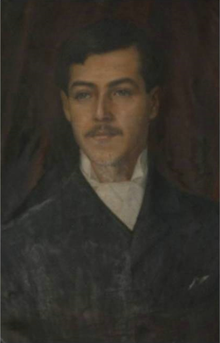Afonso Lopes Vieira
Afonso Lopes Vieira (born January 26, 1878 in Leiria , Portugal , † January 25, 1946 in Lisbon , Portugal) was a Portuguese writer. Along with António Sardinha, Lopes Vieira was one of the most important representatives of Portuguese integralism and a conservative intellectual who had a conservative-radical revolution in mind. His work is of eminent importance for understanding Portugal's history and culture in the first half of the twentieth century.
Life
Although Lopes Vieira was born in Leiria, he spent most of his life in the capital, Lisbon. In Coimbra , he studied from 1894 to 1900 law , then worked until 1916 as an editor of the parliamentary newspaper of the National Parliament to subsequently adopt the rest of his professional life as a lawyer.
In literary terms , he also worked for various magazines, such as A Aguia , Naçao Portuguesa and Contemporanea .
The travel-loving author toured Spain , Italy , France , Belgium , North Africa and Brazil .
He also worked for film: he wrote the scripts for two nationalist films, Camões (1946), about the life of the national poet and Ines de Castro (1944) about the hopeless love of a lady-in-waiting for the Portuguese Infante; In 1928 he directed the short film "O afilhado de St. Antonio".
Since he wanted to see himself as "upper class", he had bought a country estate in São Pedro de Muel , where he could withdraw from the hectic and noisy Lisbon. In 1902 he married. On January 25, 1946, the ardent Salazar trailer died in Lisbon.
Lopes Vieira and Portuguese Integralism
Alongside his compatriot António Sardinha, he was one of the main exponents of integralism and fascism in Portuguese literature in the first half of the twentieth century. Integralism was particularly evident in his lyrical work; Countless poems testify to nationalist, ethnic , racial and fascist ideas. He was co-initiator of the national newspaper "Lusitania", which only appeared from 1924 to 1927.
He was also a member of the group (not to be confused with the magazine) “Renascença Portuguesa” and dreamed of an all-encompassing conservative revolution, first in Portugal, then in Europe. The stylistic main imprints of his work were the neo-romanticism , the Saudosismus which sebastianism , the nationalism and the Neogarrettismo . He also advocated a renewal of the Portuguese theater and wanted to revive the values of the "national playwright" Gil Vicente . A well-known phrase of his, "Reaportuguesar Portugal" (Reportugalized Portugal), made him a nestor of conservative literature in Portugal to this day .
Honors from the state
Modern Portuguese democracy honored the conservative author astonishingly often, officially, in order to take the wind out of the sails of neoconservative circles, that is, to prevent new, neoconservative authors from emerging from the right wing. A measure that has been successful so far. The city library in his hometown is named after him and there is a large memorial for the poet and a secondary school bears his name. There is a bust in Marinha Grande . Streets were named after the author in Lisbon, Porto , Marinha Grande and São Paulo / Brazil.
Work (selection)
- Naufragos.Versos Lusitanos (1896), poetry.
- Para que? (1897), poetry.
- O meu Adeus, (1900), poetry.
- Animais. Nossos Amigos (Animals are our friends), Animal Protection Book, 1911.
- Cançoes de vento e do sol, (Songs of the Wind and the Sun), (1911), poetry.
- Arte Portuguesa (Portuguese Art), non-fiction book about art, 1916.
- Ilhas de Bruma (1917), poetry.
swell
- Afonso Lopes Vieira. Leiria, 1878 - Lisboa, 1946. Retrieved April 10, 2014 .
- Afonso Lopes Vieira (biography). Retrieved April 10, 2014 .
- http://www.infopedia.pt/$afonso-lopes-vieira
- http://www.imdb.com/name/nm0519848/
- http://www.waymarking.com/waymarks/WMAF0Z-Afonso_Lopes_Vieira-Leira_Portugal
- http://www.citi.pt/cultura/literatura/poesia/antonio_gedeao/vieira.html
- Knauer Lexicon of World Literature, 1999, Bechtermünz-Verlag.
| personal data | |
|---|---|
| SURNAME | Lopes Vieira, Afonso |
| BRIEF DESCRIPTION | Portuguese writer |
| DATE OF BIRTH | January 26, 1878 |
| PLACE OF BIRTH | Leiria , Portugal |
| DATE OF DEATH | January 25, 1946 |
| Place of death | Lisbon , Portugal |

